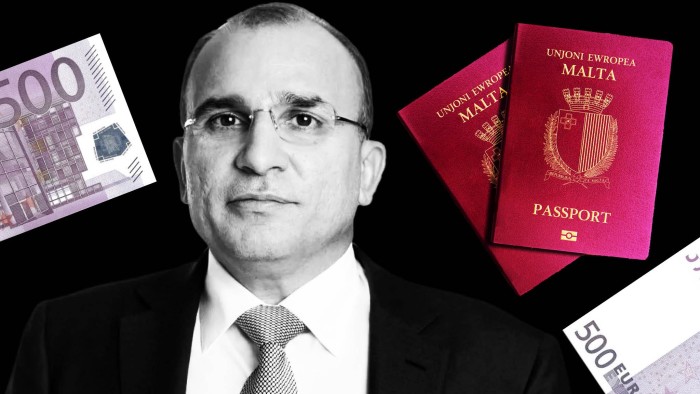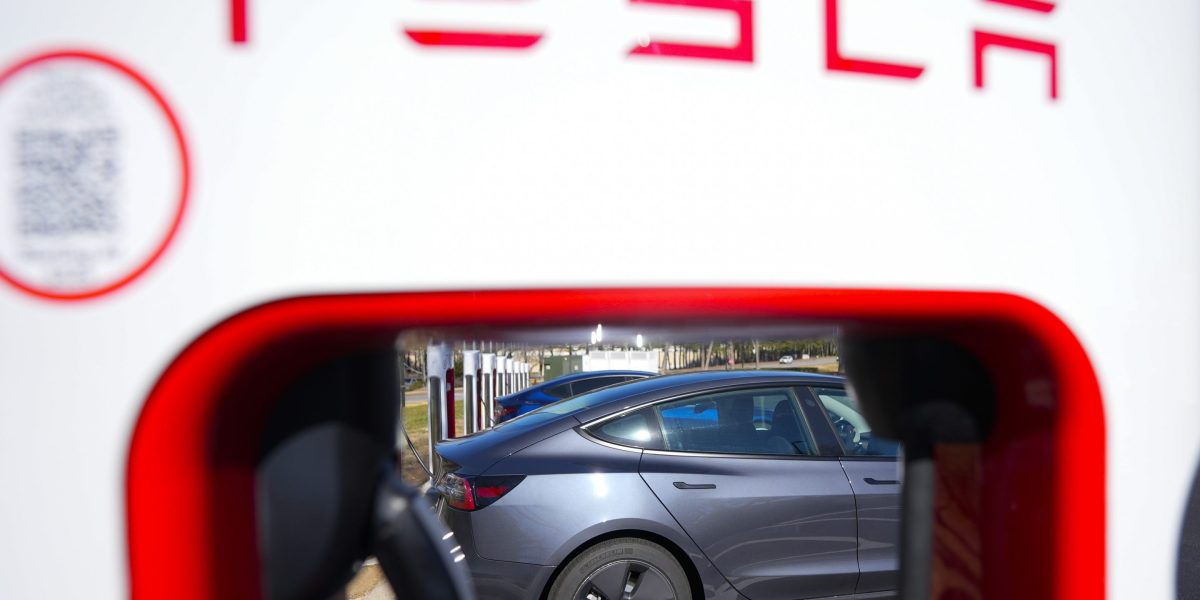Russian businessman Albert Avdolyan has been hit with EU sanctions over Moscow’s war in Ukraine, but can partially circumvent the bloc’s travel ban thanks to a Maltese passport he bought under a “golden” visa scheme that faces a European court ruling on its future this week.
Avdolyan, who received his passport in 2015, is one of seven people who acquired Maltese citizenship and were later hit by US, EU or Ukrainian sanctions over Russia’s war in Ukraine, according to a tally by the Financial Times based on names published in the country’s Government Gazette and leaked documents.
The passport-holders are among a larger group of 16 people who successfully paid for Maltese citizenship despite being politically exposed individuals, or who later appeared on sanctions lists or were convicted of crimes.
Malta is the last EU country that still offers citizenship for sale, drawing ire from the European Commission, which has taken the country to the European Court of Justice in a bid to halt the scheme.
The commission has argued the scheme “undermines both the essence and the integrity of EU citizenship”. The court is expected to rule on Tuesday.
Schemes offering citizenship or residency for cash have been common in Europe and the Caribbean for decades, but have drawn criticism. When the UK scrapped its golden visas, it said the scheme had given “opportunities for corrupt elites to access the UK”. The European Commission has said such programmes pose “significant risks, including corruption, money laundering and tax evasion”.
“It’s an insurance policy for some, it is an exit strategy for some . . . these schemes are very problematic for several reasons,” said Eka Rostomashvili of Transparency International. “It opens the EU’s doors, so not just Malta’s doors.”
Rostomashvili said it was a “trend” in Malta and other countries offering cash for citizenship that people would apply for passports “just before sanctions were placed on them or just before a big scandal would break and criminal prosecution would begin”.
People purchasing Maltese passports become EU citizens with the right to live inside the bloc. They can open EU bank accounts and businesses easily, and travel to many other countries without a visa.
Applying for citizenship in 2014, Avdolyan praised Malta’s “reliability, security, peace, quietness and pleasant people”.
Also among those who received Maltese passports were three individuals subsequently subject to US sanctions over the war in Ukraine, and three others sanctioned by Kyiv.
The sanctioned individuals include Evgeniya Vladimirovna Bernova, who the US accused of “deceptively acquir[ing] dual-use equipment” that could be used for military purposes “on behalf of Russian end users”. The US said she had “facilitated the export of equipment . . . to intended government end users in Russia” by a Malta-based company she operated.
Bernova said she had “acquired Maltese citizenship pursuant to a thorough and multi-tiered due diligence process” and that she had “genuine links to Malta”, including a business she said was an “actual investment in Malta, and nothing illicit or hidden”. She said she had invested in film production on the island and also had “deeply personal reasons” for pursuing citizenship.
Bernova said the sanctions listing was a “misapprehension by US authorities”.

At least one of the Maltese passports has subsequently been revoked.
In addition to people later sanctioned or convicted, those with paid-for Maltese citizenship also include political figures. So-called politically exposed individuals are treated by regulators as bearing a particular risk of corruption.
Three members of the Saudi royal family — Prince Khaled and his sons Bader and Mishaal — received Maltese passports. There was no immediate response to a request for comment from Prince Khaled and his family through their company.
The Maltese government also gazetted a “Gilberto Eduardo Gerardo Cojuangco Teodoro” as a new citizen in 2016, the same name as the current national defence secretary of the Philippines. A lawyer for Teodoro said he was “neither a citizen of Malta nor a holder of a Maltese passport” but declined to comment on whether Teodoro had returned a passport since 2016.
No allegations of corruption have been made against the Saudis or Teodoro.
The European Commission said: “EU values are not for sale. Investor citizenship schemes constitute a breach of EU law . . . they should be abolished.”
Malta requires applicants to make a one-off investment of at least €600,000, either purchase or rent a property, donate €10,000 to charity and live in the country for three years. The investment may be reduced to a single year for people investing €750,000.
Avdolyan, who owns coal and gas companies in Russia, said in his application that “as a businessman, the holding of such a passport will assist greatly with my regular trips to Europe and around the world”.
Avdolyan, whose four children and wife also acquired Maltese passports, can still travel to Malta, despite being hit with EU sanctions in February for his businesses “providing a substantial source of revenue” to the Russian government.
His sanctions listings note he is “closely associated” with state weapons giant Rostec.
Documents from the private company Henley & Partners, which were leaked to the Organized Crime and Corruption Reporting Project and shared with other media, show the Avdolyans received residency cards in 2014 and travelled to Malta four times in the following year.
Henley designed and executed the “golden” passport system when it started in 2013.
The documents suggest the Avdolyans spent about two weeks in the country, supplying hotel and restaurant bills and private jet reservations as proof. The properties they rented — including a “boutique apartment” in Sliema on the coast overlooking Valletta — were selected and managed by Henley, which paid the rent yearly and emptied the mailbox monthly.
Identity Malta, the government body tasked with approving applications, said that “in principle” Avdolyan had fulfilled all the requirements of 12 months’ residency in Malta. Avdolyan said “we refuse to make comments regarding the points indicated”.
Pavel Melnikov, a Russian millionaire, received a Maltese passport in 2015 and a passport from St Kitts and Nevis in 2012 with the help of Henley, leaked records show.
In 2018, Finnish authorities raided his properties in the Finnish archipelago of Turku. He was sentenced for tax and accounting fraud in Finland in February. His citizenship of Malta has since been revoked.
Melnikov is appealing the conviction and said he would challenge the revocation of his Maltese passport, which he said took place “without legal grounds”. His lawyer, Kai Kotiranta, said: “Melnikov has denied any and all wrongdoings in Finland or elsewhere. He has obtained his nationalities based on the local legislations and clearances, which is nothing new or un-normal.”
Melnikov said he had obtained his Maltese citizenship “solely to be able to live and move around Europe, not to obtain any tax breaks. The Maltese passport was only obtained legally, following all legal requirements, and not through any criminal schemes”.

Another example is Semen Kuksov, who was jailed in the UK last year for laundering criminal funds. The Crown Prosecution Service said the 24-year-old acted as a courier “to collect criminal money and deliver the laundered money overseas”.
Amid similar revelations, Cyprus and Bulgaria abandoned their passport sales programmes under pressure from Brussels. But Malta’s government maintains its scheme, arguing it has tightened due diligence checks and barred Russian and Belarusian citizens from acquiring its passports.
“What Malta has done is sort of hacked the European Union,” said Matthew Caruana Galizia, of the Daphne Caruana Galizia Foundation. “We created this commons in the EU, and now member states are starting to sort of eat [away] at it.”
US President Donald Trump this year announced plans for a US “gold card” worth $5mn. In Europe, countries such as Portugal, Spain and Hungary still offer residency permits for cash, but not passports.
Caruana Galizia’s mother Daphne, a journalist who revealed the nascent golden passport scheme in Malta, was killed by a car bomb in 2017. Paul Caruana Galizia, her son, is now an FT reporter. The trial of two men accused of involvement in her murder began on Thursday in Malta.
The Maltese government did not respond to a request for comment.
Sarah Nicklin, spokesperson for Henley & Partners, said she could not comment on individual cases because of missing information and data protection. She said an individual “may pass all the stringent due diligence tests imposed, but still go on to engage in criminal activity”.
She said that “Malta did actually require applicants to establish a place of residence and other actual links to the country . . . Henley & Partners has, at all times, abided by the laws and regulations in all of the countries in which it operates.”
Henley, which previously received a fee from the Maltese government for every successful application, is now one of many companies executing the programme.
Matthew Caruana Galizia said improved due diligence checks would not fix the scheme, as the problem lay with the people drawn to apply. “It is not with incremental changes that [you can] stop . . . letting the bad guys in. It’s more to do with the nature of the scheme itself,” he said.
Campaigners fear an ECJ ruling in favour of Malta could embolden other countries such as Cyprus to revive or open new such schemes.
“If that happens, we will likely see a race to the bottom . . . in terms of standards, in terms of checks,” says Rostomashvili.
Additional reporting by Chris Cook in London, Richard Milne in Oslo, Polina Ivanova in Berlin and Ahmed Al Omran in Jeddah




